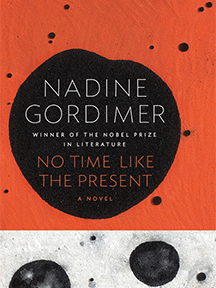By Carey Wall
South Africa since apartheid has been jettisoned, mainly from the time after Mandela’s presidency until the near present. Nobel Prize winner Gordimer’s interest lies in former freedom fighters’ unease with the political reconstruction they have invested their young vitality in helping to produce. Political time moves to that of Jacob Zuma’s campaign for the Presidency while under indictment for a number of crimes, when he and other members of their own ANC have bought into corruption, betrayed the Movement’s ideals. Steve, white, and Jabulile, black, his wife, in a solid marriage of Struggle comrades, always think about the implications of the choices they make in their post-Struggle personal lives in terms of the reality they committed themselves to bring about, now that operations are out of their hands.
Gordimer keeps close to these two, focusing on their ethical lives rather than backgrounded familial and community life with one daughter, one son, two pairs of neighborhood former comrades and another neighbor engaged in the gay struggle for recognition. But the book moves via third-person narrative; Gordimer, another thinker, is the one the reader is closest to. The style is intellectual conversational, with lots of specifications and disruption of conventional syntax where it might get in the way of emphatic focus. The attendant characters amplify the strenuous exercise of political awareness, especially in Jabu’s closeness to her schoolmaster and church Elder father, who has educated his bright daughter (more than his disappointing sons) for the new reality, which is partly achieved in post-apartheid South Africa where white and black may marry and all can live anywhere and work anywhere—anywhere they can afford to live and in any job they have the qualifications for.
The new South Africa is freer and the black characters cannot diminish the importance their new freedoms. But what the Struggle was to achieve was “a better life for all,” while these decades after the overthrow of the old white government, the remaining problem lies in the cleavage between achieved promise for some—the new middle class, including blacks—and the poverty and degradation of so many. Detail: “total enrollments, 97 percent of the country’s children are in schools, 40 percent are now in no-fee schools. Recent statistics show 67.4 percent of schools have no computers, 79.3 percent have no libraries. And 88.4 percent no functional lavatories.”
Was this what we fought for? What is our obligation now? Do we owe it to our children to migrate to a sounder society? Or do we betray ourselves if we leave our own country? How does one keep faith with the important self defined by activity in the Struggle? Does community trump individuality? What do we owe the comrades, the new shared community of our lives? Do struggles ever end?
Carey Wall is professor emerita in the Department of English and Comparative Literature at San Diego State University. San Diego State University is home to the Nu of California Chapter of Phi Beta Kappa.




